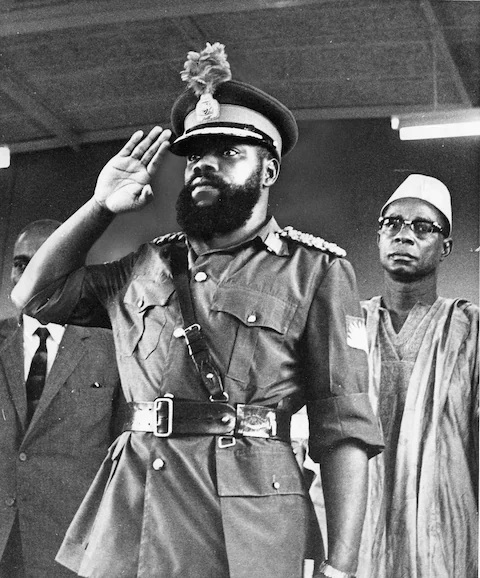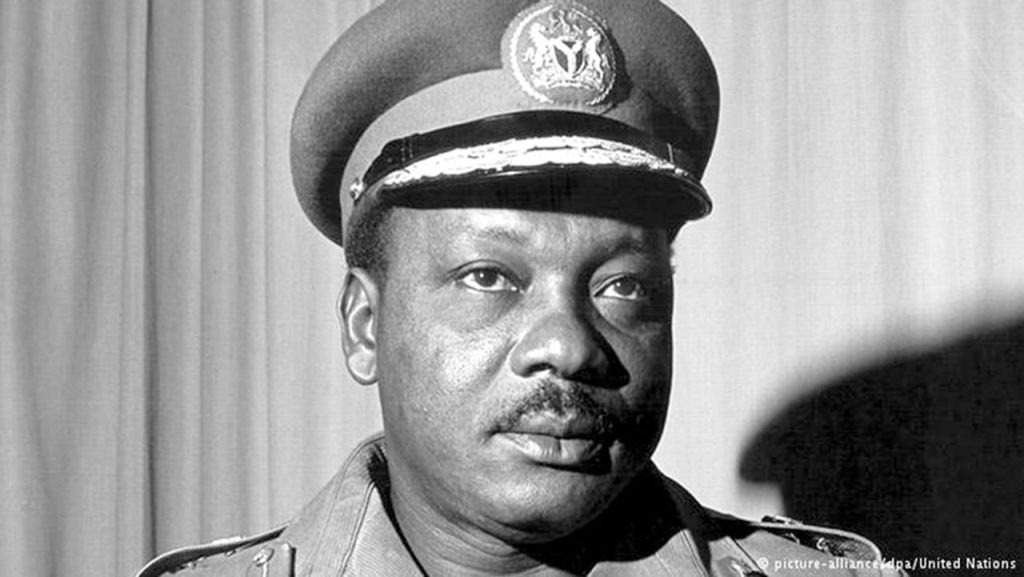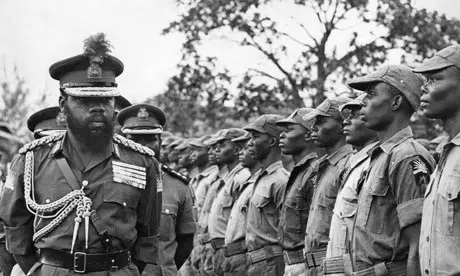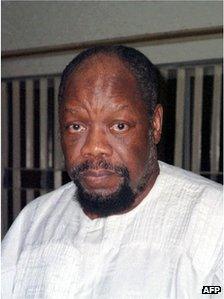The events in Biafra from 1967 to 1970 are interesting enough to study independently. Over 50 years ago, Igbo (Ibo) military leaders sought to split from Nigeria’s Eastern area to establish the independent Republic of Biafra. Were they successful? Of course, not. Nigeria remains one. But a few sects are still interested in the agitation to break away from the country. The most recent is IPOB – the Independent People of Biafra. During the first failed attempt to split from Nigeria, large-scale massacres occurred on both sides. Ojukwu played a key role at the beginning and the end. Why did he lead the secession? Here is the story of Odumegwu Ojukwu, the founder and first president of the secessionist republic of Biafra.
Who Was Odumegwu Ojukwu?
Chukwuemeka Odumegwu Ojukwu was a Nigerian military commander, statesman, and politician. He presided over the secessionist Republic of Biafra from 1967 to 1970 after it declared independence from Nigeria. He also served as the military governor of Nigeria’s Eastern Region in 1966.
The declaration of Biafra’s independence by Lt. Col. Chukwuemeka Odumegwu Ojukwu in May 1967 made him well-known but controversial. Some believed Ojukwu’s choice was unavoidable given the imminent threat the Eastern Region of Nigeria’s people faced after two coups in 1966. Others believed that Ojukwu’s challenge of Nigeria, the most important and promising of Britain’s colonial legacies in Africa, was an impossible undertaking.

However, Ojukwu and his ambition have remained controversial over the years.
Some called him rebellious, others labeled him a “one-Nigerianist,” while he’s a hero to certain people. The fact that he switched sides to become one of the leading proponents of “one Nigeria” is interesting. His “wrongs” were so widely felt that any attempts he made to make amends were mocked.
In his prime, Ojukwu was hated by some and loved by others. But his most intriguing feature was his courage to mend fences rather than his allegedly aggressive attitude.
Odumegwu Ojukwu’s Early Life and Education
Odumegwu Ojukwu was the son of Sir Louis Odumegwu Ojukwu, an Igbo businessman from Nnewi, Anambra State, in southeast Nigeria. He was born on November 4, 1933, in Zungeru, northern Nigeria. Sir Louis was in the transport industry and used the post-World War II economic boom to his advantage to become the wealthiest person in Nigeria.
Odumegwu Ojukwu started his educational journey in Lagos, southwest Nigeria.
Emeka Ojukwu started his secondary school at CMS Grammar School in Lagos in 1943 when he was ten years old. Later, in 1944, he transferred to King’s College in Lagos and enrolled. He ran into difficulties there and was briefly jailed for attacking a British teacher who had broken up a student walkout in which he had taken part. Numerous local publications in the region ran in-depth articles about this incident. His father sent him to the UK when he was 13 to further his schooling. He first studied at Epsom College before transferring to Lincoln College at Oxford University, where he earned a master’s in history. He went back to colonial Nigeria in 1956.
Early Beginnings in His Career
At Udi, in what is now Enugu State, Ojukwu began his career in the Nigerian government as an administrative officer. He served in the colonial civil service for two years before leaving in 1957 to join the military, originally enlisting as a non-commissioned officer (NCO) in Zaria in an effort to escape his father’s influence on his civil service career.
Due to Sir Louis’ influence over the then-Governor-General of Nigeria, John Macpherson, Ojukwu was compelled to enlist as an NCO to prevent him from receiving an officer cadetship. Although Sir Louis and Governor-General Macpherson thought he wouldn’t adhere to the demanding NCO schedule, he persisted.
Afterwards, the British Depot Commander suggested Ojukwu for an officer’s commission after an incident in which he reprimanded a drill sergeant for pronouncing the safety catch of the Lee-Enfield. 303 rifle incorrectly.
Ojukwu left Zaria initially for the Royal West African Frontier Force Training School in Teshie, Ghana, and then travelled to Eaton Hall to obtain his appointment as a Second Lieutenant in March 1958. He was among the first university graduates to be appointed to the army. Later, he went to the Warminster Infantry School and the Hythe Small Arms School. He was given the Fifth Battalion of the Army in Kaduna after completing additional military training.
There were only 15 Nigerian officers out of the 250 in the Nigerian Military Forces at the time. There were 6,400 more ranks, and 336 of them were British. In 1964, Ojukwu was promoted to Lieutenant-Colonel and posted to Kano. Here, he was the commander of the 5th Battalion of the Nigerian Army. This was after serving in the United Nations peacekeeping mission in the Congo under Major General Johnson Thomas Aguiyi-Ironsi.

Read: The Fascinating Life of Herbert Macaulay, a Nigerian Nationalist
Innovative Tech Solutions, Tailored for You
Our leading tech firm crafts custom software, web & mobile apps, designed with your unique needs in mind. Elevate your business with cutting-edge solutions no one else can offer.
Start Now1996 Coup and the Nigerian Civil War
Lieutenant-Colonel Ojukwu was in the northern Nigerian city of Kano when Major Patrick Chukwuma Kaduna Nzeogwu executed and declared a violent military coup in Kaduna on January 15, 1966. And to Ojukwu’s credit, the coup lost its momentum in the north, where it had been successful. Lt. Col. Odumegwu-Ojukwu’s forces supported Major-General Aguiyi-Ironisi, the Supreme Commander of the Nigerian Armed Men. Although the coup failed in other regions of the country, Major Nzeogwu was in charge of Kaduna.
Aguiyi-Ironsi assumed control of the government, thereby making history as the first military head of state. On January 17, 1966, he appointed military governors to head the four regions. Lt. Col. Odumegwu-Ojukwu was appointed to serve as the Eastern Region’s military governor. Other appointees were Lt.-Cols. David Akpode Ejoor (Mid-West), Francis Adekunle Fajuyi (West), and Hassan Usman Katsina (North). And together with Chief of Staff Army HQ, Lt. Col. Yakubu Gowon, Chief of Staff, Supreme Headquarters, Brigadier B.A.O. Ogundipe, Commodore J. E. A. Wey, Commanding Officer of the Nigerian Navy, Lt. Col. George T. Kurubo, Commanding Officer of the Air Force, and Col. Sittu Alao, these men made up the Supreme Military Council.

Odumegwu Ojukwu and the Anti-Igbo Pogrom
The 1966 anti-Igbo pogrom started on May 29. Odumegwu Ojukwu encountered challenges since he took every precaution to avoid reprisals and even urged people to come back after getting promises of their safety from his supposed colleagues in the north and the west.
Among the officers who led the majority of Northern soldiers in a mutiny on July 29, 1966, which subsequently evolved into a “Counter-Coup” or “July Rematch,” were Majors Murtala Muhammed, Martin Adamu, and Theophilus Yakubu Danjuma. The coup attempt in the southeast of Nigeria, where Ojukwu was the military governor, was thwarted by the brigade commander’s efforts and the unwillingness of northern officers stationed there.

The Death of General Aguyi-Ironsi and Colonel Fajuyi
In Ibadan, the host, Colonel Fajuyi, and the Supreme Commander, General Aguiyi-Ironsi, were kidnapped and killed. Ojukwu insisted that the military hierarchy be maintained after accepting Ironsi’s passing. Brigadier Babafemi Ogundipe was then the next-highest-ranking army officer after Ironsi.
Although Lieutenant Colonel Yakubu Gowon and Lieutenant Colonel Ojukwu held the same rank in the Nigerian Army, the counter-coup leaders insisted that Gowon be appointed as the country’s commander. Unfortunately, Ogundipe was unable to collect sufficient force in Lagos to establish his authority because the Guard Battalion he had at his disposal was commanded by Joseph Nanven Garba, a participant in the coup. Then, he chose to abstain after realizing this. Ojukwu’s demands couldn’t be carried out by Ogundipe without the coup planners’ consent, hence, the decision. The aftermath of this resulted in a deadlock between Ojukwu and Gowon, which set off a series of events that eventually led to the Nigerian civil war.
Odumegwu Ojukwu’s Role in Biafra
The Nigerian military hierarchy travelled to Aburi, Ghana, in January 1967 to attend a peace conference that General Joseph Ankrah hosted. And on May 30, 1967, Colonel Odumegwu-Ojukwu proclaimed Eastern Nigeria a sovereign state known as ‘Biafra.’ This resulted from the implementation of the accords established in Aburi falling apart following the leader’s return to Nigeria.
Gowon attacked Biafra and declared war on it on July 6, 1967. In addition to the Aburi Accord, which sought to avert conflict, there were also the Niamey Peace Conference (1968), presided over by President Hamani Diori, and the OAU-sponsored Addis Ababa Conference (1968), led by Emperor Haile Selassie. But this was the final diplomatic effort made by Generals Ojukwu and Gowon to end the conflict.
With Ojukwu’s permission, some accused coup plotters from July 1966, including Major Victor Banjo, were executed for treason in 1967. One among them who was put to death was Major Ifeajuna. However, the defendants maintained that they were not guilty of treason since they had asked the federal authorities to negotiate a settlement.
As it became clear that the war was lost after fighting for about two and a half years, Ojukwu was persuaded to flee the nation to avoid being killed. On January 9, 1970, he delegated authority to Major-General Philip Effiong, the Chief of General Staff, and left for the Ivory Coast. President Félix Houphouet-Boigny, who recognized Biafra on May 14, 1968, offered him political shelter.
The Death of Odumegwu Ojukwu
Odumegwu Ojukwu passed away in the United Kingdom on November 26, 2011, at 78, following a brief illness. The day his remains were flown back to Nigeria from London before his burial on Friday, March 2, 2012, the Nigerian Army honoured him with the highest military honour and held a funeral march in Abuja, Nigeria. He was laid to rest in a recently constructed mausoleum within his Nnewi estate.
He had a weeklong funeral rite alongside Chief Obafemi Awolowo in Nigeria before his final interment. His body was moved around the five Eastern states, Abia, Imo, Ebonyi, Enugu, and Anambra, including the country’s capital, Abuja. Memorial services and public ceremonies were also held in his honour in many places across Nigeria, including Lagos and his birthplace, Niger State. There was also a ceremony in Dallas, Texas, United States. President Goodluck Jonathan of Nigeria and former president Jerry Rawlings of Ghana were among the dignitaries who attended his funeral.
Before you go…
Hey, thank you for reading this blog to the end. I hope it was helpful. Let me tell you a little bit about Nicholas Idoko Technologies. We help businesses and companies build an online presence by developing web, mobile, desktop, and blockchain applications.
As a company, we work with your budget in developing your ideas and projects beautifully and elegantly as well as participate in the growth of your business. We do a lot of freelance work in various sectors such as blockchain, booking, e-commerce, education, online games, voting, and payments. Our ability to provide the needed resources to help clients develop their software packages for their targeted audience on schedule is unmatched.
Be sure to contact us if you need our services! We are readily available.











